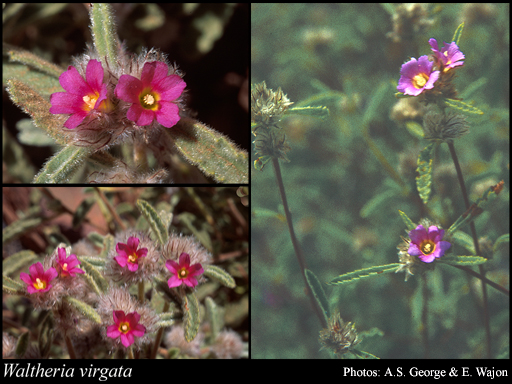- Reference
- Ewart & O.B.Davies, Fl.N.Territory 190 (1917)
- Conservation Code
- Not threatened
- Naturalised Status
- Native to Western Australia
- Name Status
- Current
Erect, spreading perennial, herb or shrub, 0.3-1 m high, to 1 m wide. Fl. pink-purple, Apr to May or Jul to Oct. Red sand, stony soils. Plains, rocky hills, stony creeks.

Scientific Description
Herb or shrub, with hairy stems. Leaves 15-35 mm long, 7-12 mm wide, not lobed; margins serrate; hairy, with stellate hairswith scales absent, Sessile glands absent; stipules present and persistent to older leaves, 6-10 mm long. Perianth clearly of two whorls (calyx and corolla), the corolla obvious and prominent. Calyx red, 5-8 mm long, the lobes fused less than half their length, Sessile glands absent, simple hairs (without tubercle bases) absent, stellate hairs present, tubercle-based simple hairs absent, gland-tipped hairs absent, scales absent, number of ribs absent. Corolla pink, blue or purple, 4-7 mm long, glabrous. Stamens many, free and inserted at the base of the ovary; filaments present. Staminodes absent, appendages absent. Ovary hairs or scales present, simple hairs present, stellate hairs present, gland-tipped hairs absent; style 1, with a lobed or capitate stigma, 0.5-1 mm long, with one style branches or lobes, mostly glabrous, wing absent. Flowering time April, May, June, July, August or October. Distribution Botanical Province Northern or Eremaean, IBRA Bioregion Great Sandy Desert, Pilbara, Little Sandy Desert, Victoria Bonaparte and Ord-Victorian-Plain.
Distribution
- IBRA Regions
- Great Sandy Desert, Little Sandy Desert, Ord Victoria Plain, Pilbara, Tanami, Victoria Bonaparte.
- IBRA Subregions
- Chichester, Hamersley, Keep, Mackay, McLarty, Roebourne, Rudall, South Kimberley Interzone, Trainor.
- Local Government Areas (LGAs)
- Ashburton, Derby-West Kimberley, East Pilbara, Halls Creek, Wiluna, Wyndham-East Kimberley.